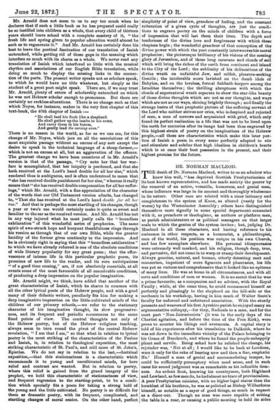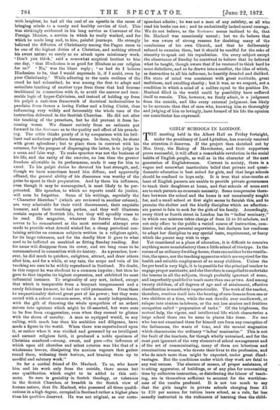DR. NORMAN MACLEOD.
THE death of Dx. Norman Macleod, writes to us an admirer who knew him well, "has deprived Scottish Presbyterianism of its best known representative, and has made society the poorer by the removal of an active, versatile, humorous, and genial man, whose influence was large in its amount and thoroughly wholesome in its nature. Other men are related with a nicer intimacy and completeness to the system of Knox, as altered (vastly for the worse) by the Westminster Assembly ; others have distinguished themselves more signally in some special department connected with it, as preachers or theologians, as authors or platform men, as parish administrators or as political managers on that larger scale to which the genius of the system invites ; but, judging Dr. Macleod in all these characters, and having reference to his eminence in other respects, as a humourist, a philanthropist, man of the world, his position was unique in his own Church, and has few exemplars elsewhere. His personal idiosyncrasies were extremely well marked, and his religion, though deep, true, and pervasive, did not come in to warp or cramp their development. Always genuine, natural, and human, utterly detesting cant and mannerism, impatient of mere figments and phantasies, his life was yet so various and comprehensive that it looked like an epitome of many lives. He was at home in all circumstances, and with all sorts and conditions of men or women. It is no secret that he was a prime favourite, as a companion and an adviser, with the Royal Family ; while, at the same time, he could recommend himself as perfectly and pleasingly to the shepherd on the hill-side or the mechanic in his workshop, having in him much of Walter Scott's faculty for unforced and unfettered association. With the sturdy peasants and weavers of his first Ayrshire parish he enjoyed many an argumentative colloquy,—for they, Radicals to a man, and for the most part ' Non-Intrusionists ' (it was in the early days of the Chartist agitation, and before the time of the Free Kirk), were prone to counter his likings and averment& A capital story is told of his experiences after his translation to Dalkeith, where he was set down in the immediate vicinity of the Palace belonging to his Grace of Buccleuch, and where he found the people unhappily pliant and servile. Being asked how he relished the change, his rejoinder was, Not at all ; I would like to be back at Loudoun, were it only for the sake of hearing now and then a fine, emphatic No.' Himself a man of genial and accommodating temper, he could be sufficiently peremptory when need arose, and in such cases his sound judgment was as remarkable as his inflexible firm- ness. An ardent Scot, knowing his countrymen, both Highland and Lowland, as few men do, he had almost no trace of provincialism. A poor Presbyterian minister, with no higher legal status than the humblest of his brethren, he was as polished as Bishop Wilberforce himself, as notable as a sayer of good things, as much in request as a diner-out. Though no man was more capable of setting the table in a roar, or causing a public meeting to hold its sides
with laughter, he bad all the zeal of an apostle in the cause of bringing minds to a manly and healthy service of God. This was strikingly evidenced in his long service as Convener of the Foreign Mission, a service in which he really worked, and for which he made long and, to him, painful journeys. He strongly believed the diffusion of Christianity among the Pagan races to be one of the highest duties of a Christian, and nothing stirred his sweet nature so surely as an attack upon missionary work.
Don't you think,' said a somewhat sceptical brother to him one day, that Hindooism is as good for Hindoos as our religion for us?" No,' was the blunt reply ; ' so bad do I believe Hindooism to be, that I would supersede it, if I could, even by your Christianity.' While adhering to the main outlines of the creed he had subscribed, he was among the first to adapt and assimilate teaching of another type from those that had become traditional in connection with it, to avoid the narrow and inex- orable logic of hyper-Calvinism, and instead of holding up from
his pulpit a cast-iron framework of doctrinal technicalities to proclaim from thence a loving Father and a living Christ, thus influencing very widely and favourably the whole tone of the instruction delivered in the Scottish Churches. He did not alter the teaching of the preachers, but he did prevent it from be- coming worse. We dissent entirely from an estimate put forward in the Scotsman as to the quality and effect of his preach- ing. The critic thinks poorly of it by comparison with his bril- liant and audacious platform harangues. In them, truly, he shone with great splendour ; but to place them in contrast with his sermons, for the purpose of disparaging the latter, is to judge in a mean and false way. To make speeches was not the business of his life, and the rarity of the exercise, no less than the greater freedom allowable in its performance, made it easy for him to excel. To his pulpit duties he devoted his best strength, and, though we have sometimes heard him diffuse, and apparently offhand, the general ability of his discourses was worthy of the pains he spent in their preparation. And by them his influence, even though it may be unrecognised, is most likely to be per- petuated. His speeches, to which no reports could do justice, will soon be forgotten. Some of his writings, especially the "Character Sketches" (which are reviewed in another column), are very admirable for their vivid discernment, their exquisite humour, and their touching pathos, and they well illustrate certain aspects of Scottish life, but they will speedily cease to be read. His magazine, whatever its future fortune, de- serves to be remembered as the most successful attempt ever made to provide what Arnold wished for, a cheap periodical con- taining articles on common subjects written in a religious spirit, for its large tolerance, and for the deadly blow it gave to what used to be inflicted on mankind as fitting Sunday reading. But his name will disappear from its cover, and ere long come to be unremembered in connection with its history. As a preacher, how- ever, he did much to quicken, enlighten, attract, and draw others after him, and for a while, at any rate, the scope and vein of his teaching are sure to be widely reproduced in Scotland. No doubt, in this respect he was obedient to a common impulse ; but then he gave to that impulse its highest expression, and exhibited its most influential instance. To originality of any sort, indeed, except that which is inseparable from a buoyant temperament and a rarely felicitous humour, he bad no valid pretensions. From these he unquestionably derived great part of his power ; but they were mated with a robust common-sense, with a manly independence, with the gift of throwing the whole sympathies of an ardent nature into opinions which might be ill-assorted, but were sure to be free from exaggeration, even when they seemed to glisten with the sheen of novelty. A man so equipped would, in any calling, with much less than his ambition and diligence, have made a figure in the world. When there was superinduced upon it, or rather when it was vivified and governed by an intelligent and earnest religious faith, it produced a noble specimen of Christian manhood—strong, sweet, and pure—the influence of which upon old churches and select coteries was like that of a wholesome breeze, dissipating the noxious vapours that gather round them, widening their horizon, and bracing them up to needful and salutary work."
So far a cordial friend of Dr. Macleod. To us, who know him and his work only from the outside, there seems but one qualification which ought to be added to this esti- mate. So rare is geniality in Scotch theology, or tolerance in the Scotch Churches, or breadth in the Scotch view of human nature, that Dr. Macleod, who possessed all three qualifi- cations in a high degree, occupied in Scotland rather a higher place than his qualities deserved. He was not original, as our corre- spondent admits ; he was not a man of any subtlety, as all who read his books can see ; and he undoubtedly lacked moral courage. We do not believe, as the Scotsman seems inclined to do, that Dr. Macleod was consciously unreal ; but we do believe that he was aware of strong reasons for doubting many of the conclusions of his own Church, and that he deliberately refused to examine them, lest it should be needful for the sake of sincerity to speak out his repudiation. On every subject except the observance of Sunday he contrived to believe that he believed what he taught, though aware that if he ventured to think hard he must disbelieve, and so be drawn into a conflict, the idea of which, as destructive to all his influence, be heartily dreaded and disliked. His state of mind was consistent with great rectitude, great usefulness, and excelling charity ; but it was, as we suspect, not a condition in which a mind of a calibre equal to the position Dr. Macleod filled in the world could by possibility have suffered itself to remain. This, however, we freely admit, is a judgment from the outside, and like every external judgment, less likely to be accurate than that of men who, knowing him so thoroughly and judging of him so lovingly, have formed of his life the opinion our contributor has expressed.



































 Previous page
Previous page